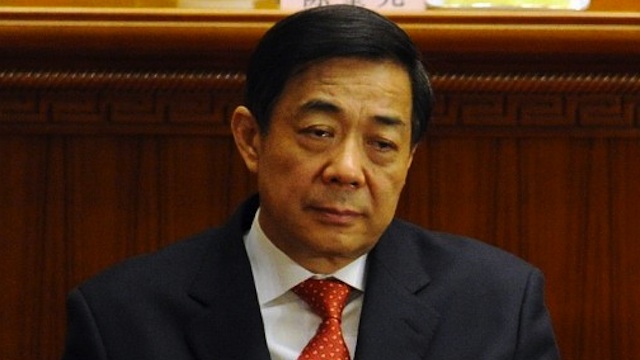SUMMARY
This is AI generated summarization, which may have errors. For context, always refer to the full article.

BEIJING, China – Former senior Chinese politician Bo Xilai has announced he will appeal against his conviction and life sentence for corruption, a lawyer told AFP Monday, Sept 23, adding further drama to the high-profile case.
Bo, the key figure in China’s biggest political scandal for decades, had already proved unusually defiant during the sensational court proceedings.
“He informed the court yesterday of his request for an appeal following the verdict,” said a lawyer with direct knowledge of the situation who asked not to be named.
The court in the eastern city of Jinan sentenced Bo on Sunday after a trial that exposed intrigue and wealth at senior levels of the ruling Communist Party.
Bo, a member of the party’s top 25-member Politburo before his downfall, was convicted of bribery, embezzlement and abuse of power.
Yet during a five-day hearing last month, he mounted a spirited defence rarely seen in Chinese trials, in which defendants typically quickly admit guilt.
Proceedings are normally not made public, but the Jinan court took the unusual step of releasing edited transcripts each day.
Bo had been a popular politician with an unusually open and charismatic style.
He poured billions into public works and social housing programmes while party chief of the southwestern megacity of Chongqing, and initiated a leftist revival with activities such as the singing of Maoist-era songs.
He also launched a high-profile anti-crime campaign that won him admirers across China.
But reports of forced confessions and torture during the crime crackdown horrified Chinese liberals, and some party leaders saw his ambition as challenging party unity.
The catalyst for his fall came when his top aide — then-Chongqing police chief Wang Lijun — fled in February 2012 to a US consulate with evidence that Bo’s wife had murdered a British businessman.
With factions at the most senior levels of the party reportedly split over how to handle the scandal, a year and a half passed before Bo went on trial.
The court sentenced Bo to life after finding him guilty of taking 20.4 million yuan ($3.3 million) in bribes.
The source said Bo informed the judge on Sunday of his intention to appeal.
“According to Chinese law, the court must accept his oral request,” the source said, adding that Bo “will appeal the entire verdict”.
Peking University law professor He Weifang said that Bo must submit a written appeal by October 8, a slight delay from the usual deadline because of a public holiday.
The court would have to hear the appeal within two months, but “it could be an entirely closed-off affair, which just happens on paper”, He said.
He said Bo’s appeal did not come as a surprise, even though it was unlikely to succeed.
“He denied all of the courts charges against him, so for him not to appeal would be unexpected,” Professor He said, adding that “the chance of the court changing the verdict is very small”.
The former mayor of Shanghai Chen Liangyu decided in 2008 not to appeal his 18-year prison sentence for corruption.
The appeal of Beijing mayor Chen Xitong against a 16-year sentence for corruption in 1998 was rejected.
State media on Monday used the trial to bolster an anti-corruption campaign launched by the party’s new leadership under President Xi Jinping.
“The sentence Bo received shows that no corrupt element is immune from the fight,” the China Daily said in an editorial.
Analysts, however, see Bo’s trial as more about politics than corruption.
David Zweig from Hong Kong’s University of Science and Technology said the objective of the trial was not to uncover graft but to ensure he was silenced, and the ending of his political career has the broader aim of weakening the party’s left-wing elements.
“It is not just the standard purge,” Zweig said. “He will spend a lot of time in jail. It is a message to the left they do not have someone they can rally around here. He is done for.” – Rappler.com
Add a comment
How does this make you feel?
There are no comments yet. Add your comment to start the conversation.